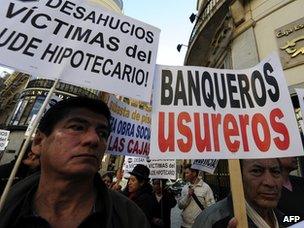Europe fears recession more than debt
- Published
- comments

Anti-eviction protesters in Madrid have condemned the banks
Sometimes a small detail can tell you which way the wind is blowing.
Spain was told on Monday night that it had to get its deficit down to 5.3% this year. That is 0.5% lower than what the government in Madrid had said it could achieve this year. Of course 5.8% was way above the 4.4% agreed with the European Commission.
The Spanish government had gone ahead and essentially said it would do what was best for Spain. It could not and would not meet the target set by Brussels.
It was a flagrant disregard for the rules, but EU officials and other eurozone finance ministers have backed off. It sends a clear message to other countries that deals can be done. The new era of budgetary discipline comes with a soft centre.
Why? Because increasingly officials fear recession more than debt and deficits. The outlook for Spain's economy is grim. It will contract by at least 1% this year. The government expects its unemployment rate to rise to 25% by the end of the year.
The budgets of the regional governments are not yet under control. Although Spain's debt-to-GDP ratio, at around 90%, is not exceptionally high, many households are still struggling with debt from the burst housing bubble. And the banks need strengthening.
The message from Madrid had been blunt: if they cut spending too fast they could tip Spain into a spiral of decline like Greece. Austerity was killing the patient.
Change of tone
Initially Brussels had been unsympathetic. "Budgets will have to conform fully with the rules of the Growth and Stability Pact," declared the President of the Commission, Jose Manuel Barroso.
But fudge is often the snack of choice in the Belgian capital. Yes, Spain is still committed to the original target of reducing its deficit to 3% by 2013. But that is another year away and it is further down the road.
As Sonny Kapoor of Re-Define think tank put it, "Spain has become a test case in how the Commission and Council will exercise their newly enhanced powers over member states' budgets."
At the end of last week, as Greece restructured its debt, there was an outbreak of Panglossian optimism. The head of the IMF detected "economic Spring is in the air". President Sarkozy declared "problem solved". Van Rompuy was in a similarly sunny mood: "the turning point in the crisis has been reached". The Germans were less sure.
All calculations however are at risk, depending on the depth of the recession. The EU predicts it will be "mild" for the eurozone and will disappear by the end of the year. But it might not and the facts give pause for thought.
Take Portugal. Its economy shrank last year by 1.6%. The prediction is it will shrink by 3.3% this year. Take Italy. The country is in recession and its economy is predicted to contract by 1.5% this year. In January industrial production shrank 5% year on year. Greece's economy shrank by 7.5% last year and is in free-fall.
Now in both Spain and Italy the governments are embracing reforms that should boost growth in the long term. They are fighting to open up closed professions and to make it easier to hire and fire. The benefits from such changes may take four years to be realised. And resistance to change is growing.
Some of the legislation in Italy on freeing up the services sector has already been watered down and proposals in Spain to slash severance pay have brought people onto the streets. A general strike has been called for 29 March. Growth in both countries remains elusive.
The "austerity fetishists" have not retreated to the sidelines but Brussels is much more aware of the danger of tipping countries into a spiral of decline. It means that the new budget rules will be operated more flexibly than their German authors might first have thought.